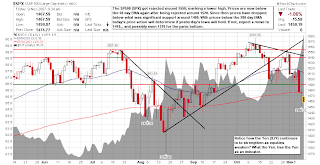
Yesterday the broader markets rallied. The Financial Index (XLF) rallied. But Citigroup hit new lows… Uh oh.
Citigroup Credit Swaps Near Highest in Five Years (Update2): “Credit-default swaps on bonds of Citigroup Inc., Wachovia Corp. and Morgan Stanley are trading at the highest in at least five years on speculation the biggest U.S. banks may be forced to write down more subprime assets.
Contracts tied to Citigroup's debt have climbed 17 basis points to 70 basis points since Oct. 31, according to broker Phoenix Partners Group in New York. The swaps are trading at the widest levels since at least September 2002, Credit Suisse Group data show. A basis point on a contract protecting $10 million of debt from default for five years is equivalent to $1,000 a year.
Credit-default swaps tied to New York-based Citigroup more than tripled in the past three weeks, indicating the risk of default is rising. Citigroup this week said losses from the assets may rise to $11 billion, and analysts said the writedowns may increase. Contracts on Morgan Stanley and Wachovia Corp. and Merrill Lynch & Co. are at or near six-year highs on concerns that their losses will grow.”
Tickers: C
Citigroup Writedowns May Be as Much as $13.7 Billion (Update6): “Citigroup Inc., the world's biggest bank, may have losses from asset-backed bonds of as much as $13.7 billion, roughly equal to the company's profit so far this year. The shares fell for a sixth straight day.”
Toss in some emergency SIV financing…
“Citigroup reported $5 billion in net income in the first quarter, $6.2 billion in the second quarter and $2.4 billion in the third quarter, for a total of $13.6 billion. Writedowns of $21.1 billion would be equal to about 17 percent of the bank's reported shareholders' equity of $120 billion in 2006.
Citigroup Inc. said yesterday that it provided $7.6 billion of emergency financing to the seven structured investment vehicles it runs after they were unable to repay maturing debt. The SIVs drew on the $10 billion of so-called committed liquidity provided by Citigroup, according to a Securities and Exchange Commission filing.”
MBIA, Ambac Losses Will Be `Massive,' Egan Jones Says (Update1): “Bond insurers including MBIA Inc., Ambac Financial Group Inc. and ACA Capital Holdings Inc. face “massive losses” over the next few quarters that could test their ability to raise new capital, Egan-Jones Ratings Co. said.
MBIA may lose $20.2 billion on guarantees and securities holdings, Sean Egan, managing director of Egan-Jones, said on a conference call today. ACA Capital may take losses of at least $10 billion; New York-based Ambac may reach $4.3 billion; mortgage insurers MGIC Investment Corp. and Radian Group Inc. may see losses of $7.25 billion and $7.2 billion, respectively, Egan said.
“There is little doubt that the credit and bond insurers face massive losses over the next few quarters and many will be capital challenged,” Egan said.”
Tickers: ABK, MBA, RDN
Dollar Slumps to Record on China's Plans to Diversify Reserves: “The dollar fell the most since September against the currencies of its six biggest trading partners after Chinese officials signaled plans to diversify the nation's $1.43 trillion of foreign exchange reserves.
The dollar fell against all 16 of the most-active currencies, declining to the weakest versus the Canadian dollar since the end of a fixed exchange rate in 1950, a 26-year low against the pound and a 23-year low versus the Australian dollar. The New York Board of Trade's dollar index dropped to 75.21 today, the lowest since the gauge started in March 1973.”
The pressure on the dollar increased substantially early this morning on news out of China. Crude oil and gold reacted by melting up…. and equity futures reacted by erasing all of yesterdays gains in the pre-market.
GM Reports $39 Billion Loss on Deferred Tax Charge (Update2): “General Motors Corp., the world's largest automaker, reported a record $39 billion quarterly loss after three money-losing years forced the company to write down the value of future tax benefits.
GM fell as much as 8.8 percent in early trading after the size of the loss surprised analysts. Excluding the tax writedown, the deficit was $2.80 a share, more than 10 times the 22 cents estimated by 15 analysts surveyed by Bloomberg.”
GM was struggling during the best of times. Now that credit is tightening and US consumers are struggling to make their mortgage payments, new car sales in the US are likely to be ‘soft’ going forward. Not and ideal time to restructure the company.
GM pulled down the DOW futures pre-market. Out one point the futures were down 187…
Tickers: GM, F
 Yen Advances to 18-Month High Against Dollar as Stocks Decline: “The yen rose to the highest since May 2006 against the dollar as investors shunned riskier assets bought with loans in Japan. The U.S. currency erased its decline against the euro after dropping to a record low.
Yen Advances to 18-Month High Against Dollar as Stocks Decline: “The yen rose to the highest since May 2006 against the dollar as investors shunned riskier assets bought with loans in Japan. The U.S. currency erased its decline against the euro after dropping to a record low.
























